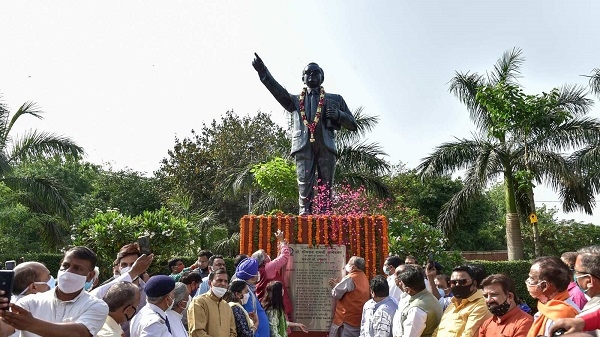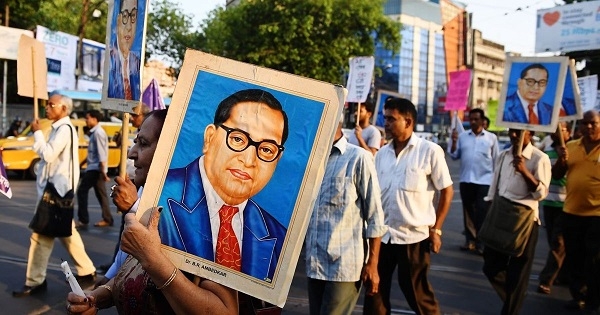Dr BR Ambedkar- Apostle of Human Rights and Human Values
Dr Ambedkar was hailed by the Columbia University as “One of India’s leading citizens, a great social reformer and vigilant upholder of Human rights”.
Total Views |
(The article was first published in year 2020)
‘Bharat Ratna’ Dr BR Ambedkar was matchless in terms of his educational qualifications. His drafting capability was superb. Pandit Jawaharlal Nehru addressing the constituent assembly observed- “Future is not one of ease or resting but of incessant striving so that we may fulfill the pledges we have so often taken and the one we shall take today. The service of India means the service of millions who suffer. It means the ending of poverty and ignorance and disease and inequality of opportunity”
He emphasized that there was a need for the visionary path of development which could be given through the Constitution and for that the Drafting Committee was constituted on 29th August 1949. Dr Ambedkar became the chairman of the drafting committee and subsequently the draft constitution was pledged before the Constituent Assembly. After two years of deliberations, on November 26, 1949, the draft was adopted, enacted and gave the most important socio-economic and political document that is the Constitution of India.

The remark of Dr Rajendra Prasad, the first president of India remarked- “we never did a better thing than having Dr Ambedkar on the drafting committee and selecting him as its chairman”. He referred to the special convocation held by Columbia University which conferred an LL.D degree on Dr. Ambedkar with a citation: “The degree is being conferred in recognition of the work done by him in connection of the drafting of the Indian Constitution”.
Dr Ambedkar was hailed by the University as “One of India’s leading citizens, a great social reformer and vigilant upholder of Human rights”. Upholding the merit of the Constitution of India it can be said that the Constitution of India is not a simple legal document or testament of dos and don’ts, but a well-designed path for socio-economic-political progress of India as a nation and as a federal society of citizens which educate freedom to all the stakeholders to protect and promote their healthy traditions and values identifying the greatness of our great Bharat.
The gist of Dr Ambedkar’s speech can be reproduced here- “On the 26th of January, 1950, we are going to enter into a life of contradictions in politics we will have equality and in social and economic life we will have inequality. In politics we will be recognizing the principle of one man one court and one court one value. In our social and economic life, we shall, by reason of our social and economic structure, continue to deny the principle of one man one value. How long shall we continue to live this life of contradictions mark of interrogation? How long shall we continue to deny equality in our social and economic life mark of interrogation? If we continue to deny it for long, we will do so only by putting our political democracy in peril. We must remove this contradiction at the earliest possible movement or else those who suffer from inequality will blow up the structure of political democracy which this Assembly has so laboriously built up”.

Addressing to the teaching community of Columbia Inter College, Aligarh, UP, about the protection and promotion of the values which are very dear to the constitution, I appreciated the ideology of Dr Ambedkar which stands for openness. The essence of constitution stands for governance which stands for Sovereignty, Socialism, Secularism, Democracy, and Republican form of state committed to justice- socio-economic and political, liberty of thought, expression, belief, faith and worship, equality of status and of opportunity and the fraternity among all the citizens assuring the dignity of the individual. The preamble of the constitution is lofty in terms of its content and message. I also emphasized that the constitutional values are not meant to be adhered to by the state only, but these must be the way of life and in day-to-day activities.
The hallmark of Dr. Ambedkar’s thesis has been ‘Equality, Liberty, and Fraternity’. Separation of power reflects the norm of good governance. Unity in diversity was very dear to him. Religious cultural and educational freedom are prescribed as essentials of fundamental rights. Observing the plight of contemporary India, Professor Shabbir said that we are duty-bound to fight against the sense of Communalism, Casteism, Regionalism, gender bias and the discrimination affecting the socio-political issues. He counts with a positive attitude for the maintenance of unity, integrity, the sovereignty of the nation and along with this the dignity of the individual.
The author lamented that observing the contemporary situation in terms of the constitutional provisions his soul must be in trouble that whatever he gave to his motherland that is not been appreciated in letter and spirit. The celebration of his birth anniversary must be tagged with the honor of principle and spirit of human values which he incorporated within the framework of the Constitution of India.
.
.
